


Home Energy Water Work Economy Solution Politics Team Product Recycling Cars Ships Aircrafts Promotion
World Pollution Air Weather Violence Women Weapons Psychology Plants Animals Food Peace Faith Imprint
Solution
The Solution
A Problem has plagued us since time immemorial: there are fewer and fewer rich people who are getting richer and richer, more and more poor people who are getting poorer and poorer, at the end nobody can buy all the nice goods, and the next global economic crisis is again there. More and more products are being developed and this senseless mass production is destroying our common living space. The economic imbalances cause poorness, hunger, refugees, strife, economic wars and heavy weapon wars over territory and resources. The surface warming reaches a momentum of its own that nobody can stop anymore and the weather remains unpredictably stormy for the next thousand years, we lose everything, possibly die out.
We no longer want the problem, we want the Solution: capital development, economic growth and profit in natural harmony. The solution would be we all go to work, the emphasis is on we all and everyone just earns something, we put something in reserve but no more billions. There is no quantitative but only qualitative growth. There is no more inflation and prices remain stable forever. Everyone is equally taken care of, there are no more disputes over territories and resources and there are no more economic wars or wars with weapons. We live adapted to our natural environment, the earth, and thus survive in the long run and in happiness.
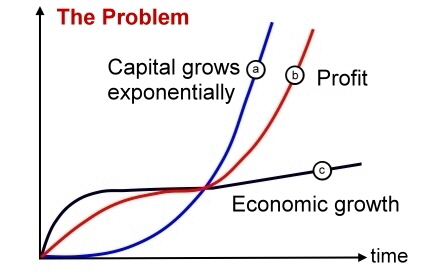
![]()
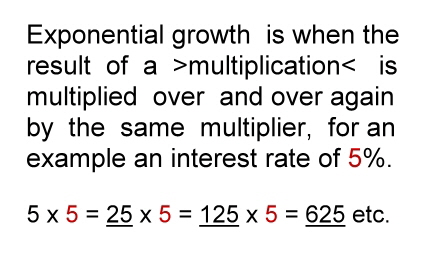
![]()
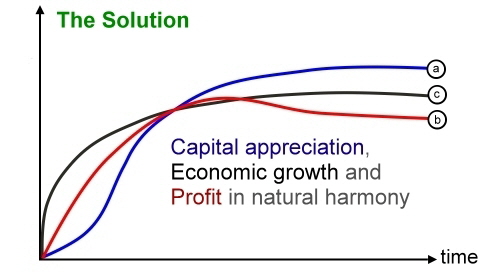
But how do we reach the solution? It's actually quite simple, namely with the exact opposite of what we're doing now. We give those who have little a lot of interest or return, and those who have a lot a lot of interest or return, correspondingly less, or even no interest or return at all. That's the first step. The second step is that the totality of all measures forms a characteristic curve that is almost inverse to the expected outcome. This stops the development we don't want.
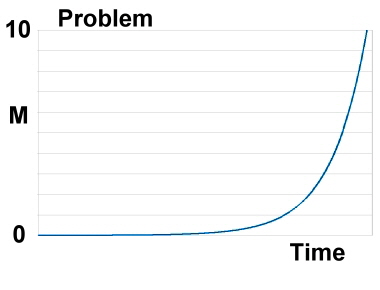
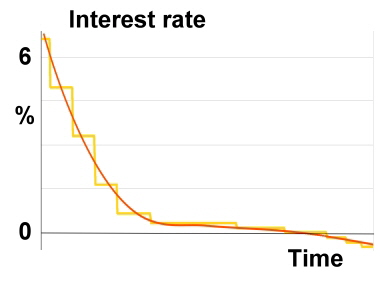
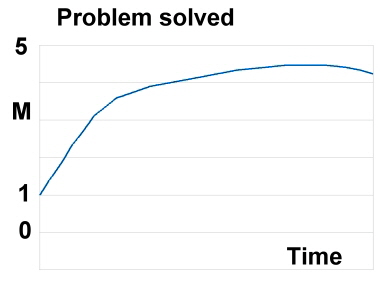
With a dynamic interest and return model, the money can come in much faster for everyone. However, it is limited to a certain amount.
The "problem" table shows capital that grows exponentially over 10 billion currency units due to constant interest rates. However, in the "interest rate" table, the interest rate is reduced from 6% to -0.5% over the same period, thus limiting the capital in the "problem solved" table from 1 billion to 4.5 billion. The capital increase can occur even more quickly due to very high initial interest rates, which could, for example, benefit an investment.
In detail: The matter can be described as follows: If someone wants to buy an electric scooter and wants to save half of it, then this could be accelerated by paying a high interest rate. He/she would like to take out a loan for the other half of the purchase amount. Now the loan interest could be lowered so that the loan is as cheap as possible and at the same time does not favor the lender too much. These processes must be written down for every activity in daily life: e.g. buying a house, bicycle, company. Something like this is already being practiced in some cases, for example with photovoltaic systems. The banks could take over the administration of such processes in a trustee function. Leverage such as raising and lowering a key interest rate will not fix the problem, it will only make it worse. Above all, the problem with the distribution of the people's funds, which are distributed upwards in the conventional, non-functioning system and thus ensure that purchasing power is choked off in the end, can be solved in this way. Because who has little in the account now gets more interest and who has a lot in the account little to negative interest. The same must also apply to the stock exchanges and in relation to returns: Whoever has a lot gets little and whoever has little gets a lot. No more alms but fair rewards for corresponding services. Who gets what when can be calculated in models by artificial intelligence and decided in parliaments through appropriate discussions.
That's the solution, that's real democracy!
The problem in practice:
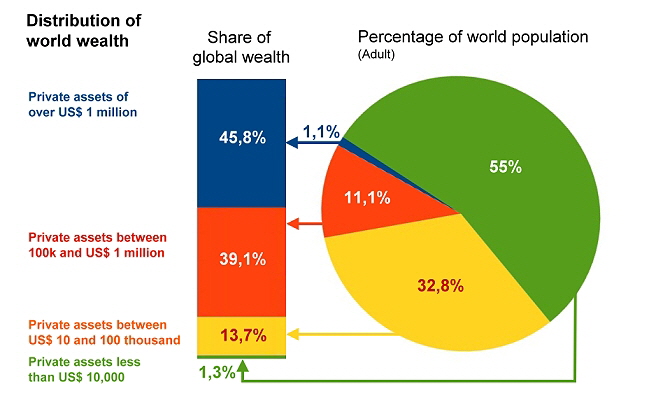
Here we see the current distribution of world wealth: 55% own only 1.3% of the total wealth and could save at most US$10,000. However, this 55% also includes those who have nothing at all and also those who are so poor that they are homeless and can no longer eat properly. 32.8% of the population could still save 10-100 thousand US $ and thus hold 13.7% of the total wealth. Only 11.1% of the world's population was able to save an amount from 100 thousand to 1 million US $ and in this way they already hold 39.1% of the total capital. Only 1.1% of the world's population has been able to hoard over US$1 million, keeping 45.8% of total world capital out of the market.
We have 12.2% of the world's population hoarding 84.9% of the world's capital in accounts, withdrawing it from the market, and wanting to receive around 10% returns every year.
Then we see 32.8% who only hold 13.7% of the total world capital, but would also like to and could receive returns of up to 10%. On the other hand, there are the 55% of the world's population who receive the lowest interest rates, can expect fewer and fewer social benefits, whose income or wages are constantly falling, and who are struggling with ever-increasing prices for housing and utilities.
Mathematically, the wealth of the top 11.1% of the world's population will of course increase much faster than that of the majority of 88.9% of the world's population, who will have to pay for this increase in wealth proportionately. Which, so or so, in the end will lead to the collapse of the markets, mass poverty , street violence and wars. All this, after almost 100 years since 1929, again, but now also accompanied by violent storms, floods, drought, fires and epidemics. A recent phenomenon is increased drug addiction, particularly in the US, which in turn will lead to street violence and rampages.
- Without a dissolution of these circumstances, it is certainly not possible to solve the environmental problems.
- To break the rise in temperature we have to break the rise in capital.
- There can not come a "green turn" with a further increase in capital and production!
- A further increase in capital is only possible with even more economic growth and the aforementioned exploitation of Human and Nature measures
- Which must lead to just the precalculated capital and temperature rise
- There will be more poor and more hunger and more refugees in the world, more violence, more wars over territory and resources
- With further mass production, heavy oil transport ships will continue to sail and emit toxins, fine dust and CO2
- With more cheap mass tourism, airplanes powered by kerosene will continue to fly
Please don't be fooled by various fantasies. The solution must involve both abandoning the "getting richer and richer ever faster" option and significantly reducing the production of short-lived and inferior products and clothing. A shift towards long-lasting, 98% recyclable products must occur. We must invest heavily in disposing of existing waste and researching new recycling methods. We must develop new ships for overseas transport and dispose of the old ones. We must develop aircraft that can be operated without polluting the environment or warming the Earth's surface. We must produce vast amounts of green energy immediately and easily without immediately filling everything up with difficult-to-recycle waste like wind turbines and photovoltaic systems. The production and disposal of wind turbines and old photovoltaic systems swallows up billions and produces more CO2 than is publicly disclosed and only serves the purpose of generating revenue from supposedly green technology. This kind of supposedly green energy is part of the problem, not the solution.
Change can't happen if everything has to generate even more profit. To achieve this, the money can't be held in bank accounts, but in the market; it must be available to companies for development and research, where potentially less promising methods can then be pursued. The only project of this kind we can afford is hydrogen neutron fusion, which is financed by taxpayer money to the highest bidder. But this technology can't solve our current problems, and a completely different truth was recently revealed by the operator of the NIF 2009: it's actually about researching nuclear fusion bombs. Such behavior is far from a solution.
Providing financial support to the poor and hungry is not the right approach; it is and can only be a stopgap measure. It's unacceptable that we first produce poor and hungry people and then offer them alms. But excuse me, this is exactly what's happening right now, and it's highly antisocial and reprehensible. It's unacceptable and/or excusable, and above all, it's not a solution.
Clearly, our first task is to stop producing poor and hungry people, and therefore, as a real solution, we must establish not only an international energy network but also an international water network to combat droughts and groundwater shortages. We must no longer exploit the countries in the hot south, but must ensure that they feed themselves and, through their own efforts, can participate in our prosperity, or rather, in a newly defined, environmentally friendly form of prosperity. That is what one can call a solution.
Not a solution either: The world's politicians have always pursued the path of maintaining the system but granting the poor certain relief, i.e., handouts. For example, social, health, and pension insurance in Germany were intended to keep the monarchy alive. The so-called New Deal was intended to preserve the capitalist system that favors the rich in the USA, and the "social market economy" was intended to reinstall capitalism in Germany. But the benefits of such measures for the working population were gradually withdrawn because they were supposedly too expensive and also to further facilitate capital growth or, as far as Europe is concerned, to truly enable unbridled capitalism again. These are not solutions but merely window dressing, obviously perpetrated by those who profit from the system of exponential interest and return growth on hoarded money. We shouldn't forget that the politicians, leaders, and dictators of the nations, together with the wealthy, brought us to the current situation with dangerous global warming.
It's probably about preventing so-called socialism, in an emergency, like in South America, Cuba or Italy... with violence, of course. But which in itself bears the same error as we have all seen so far. A certain class is doing well, hoarding funds for relatives and friends, and the rest of the population lives in relative poverty (the only exception being Cuba) and may not be allowed to travel or emigrate. This is not a solution either, and the Eastern European countries in particular contributed to a high proportion of environmental pollution and surface warming.
The constant struggle to prevent so-called socialism, even by force in an emergency, as happened back then in South America, Cuba, or even Italy... of course. But this inherently suffers from the same flaws as we have all seen so far. A certain segment of the population lives comfortably, hoarding money for relatives and friends, while the rest of the population lives in relative poverty (the only exception being Cuba) and is often not allowed to travel or emigrate. This, too, is not a solution, and the Eastern European countries in particular contributed significantly to environmental pollution and global warming.
The solution lies in generally and sustainably preventing the impoverishment of the population, farmers, and companies, especially small businesses. Adjusting economic growth to what is necessary, not to the supposed, abstract needs and desires of capital owners, to what is possible on earth. These capital owners, in turn, cannot guarantee this at all, because they simply have neither the sufficient education nor the knowledge, nor, above all, the will to calculate their actions. The only thing these capital owners can do is generate even more capital within the framework of the power that capital grants them, but this ultimately always leads to their own downfall and, in the long term, destroys the planet's ecosystem. Therefore, capital owners, like current politicians and dictators, must obligatorily submit to the decisions of qualified scientists. "Entrepreneurial freedom" must no longer exist in the future, and in particular, it must no longer be the case that capital owners can directly or indirectly create their own laws against all common sense.
To the top ![]()
![]()
![]()
Home Energy Water Work Economy Solution Politics Team Product Recycling Cars Ships Aircrafts Promotion
World Pollution Air Weather Violence Women Weapons Psychology Plants Animals Food Peace Faith Imprint